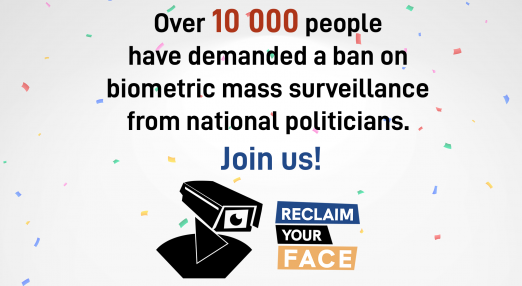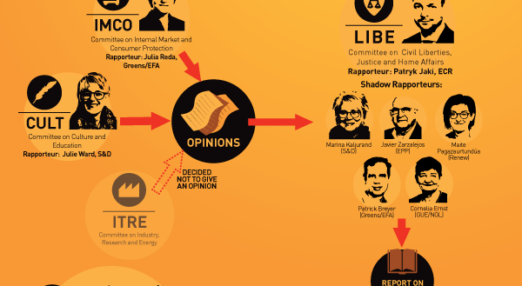Statement: civil society challenges EU plans to expand biometric mass surveillance
On 9 December, the European Commission presented its new Security Union package, composed of the Counter-Terrorism Agenda and a proposal to strengthen the mandate of Europol. Originally intended for next year, the release of the Counter-Terrorism was accelerated due to recent attacks in France and Austria. When it comes to protecting fundamental rights from intrusive biometric surveillance, the proposals fall seriously short.
In his opening remarks at the presentation of the Package, Commission Executive Vice-President Schinas recalled that “the European way of life is not optional and we must do all in our power to prevent those that seek to … undermine it.” The Agenda itself starts with the acknowledgement that “[d]emocracy, rule of law, respect for fundamental rights in particular the right to privacy, freedom of expression, freedom of religion and respect for diversity are at the foundation of our Union”.
Notably, the UN Special Rapporteur on human rights and counter-terrorism estimates that around 67% of people affected by counter-terrorism or security policies are human rights defenders. Furthermore, human rights groups have long warned that ill-conceived counter-terrorism policy will discriminate against racialised and minoritised groups and suppress freedom of expression.
Nevertheless, the narrative in the rest of the Agenda, as well as in the Europol proposal, raises serious doubts about the Commission’s commitment to protect people’s rights and freedoms when they are threatened by the unfettered use of their biometric data. Both documents make knee-jerk proposals to expand biometric laws and systems which risk violating the integrity of public space, which is and must remain a space for the exercise of rights and freedoms for individuals, and a fundamental pillar of our democracies.
A worrying example is the plan in the Counter Terrorism Agenda to deploy face recognition technologies in public spaces to identify “potential threats”. Although the Commission announces that the use of these technologies will happen in what it describes as a “well-defined, targeted and proportioned manner”, the wording in the Agenda clearly suggests that the goal is to introduce wide use of face recognition in public spaces, which will amount to unacceptable biometric mass surveillance. What is more, this proposed biometric surveillance is no longer only connected to the idea of smart cities or safety, but becomes an integral part of our urban architecture. Our cities, according to the Commission, must become more than ever places of constant suspicion and watching.
Similarly, equally significant concerns are raised by the Europol proposal. Europol has recently been admonished by the European Data Protection Supervisor (EDPS) for abuses of Europeans’ personal data. Despite this, the Commission’s proposal seeks to grant Europol new powers to conduct wide-scale biometric surveillance, positioning new technologies as a necessary tool to fight terrorism. The proposal also grants Europol the possibility to access and manage huge databases of personal data of individuals, without sufficient guarantees for individuals’ rights and without sufficient accountability and oversight. This is happening alongside a EUR 30 million bump in funding for Europol to further develop automated biometric identification systems.
In these proposals, the Commission looks at public space as an opportunity for ever-expanding surveillance. If protecting public spaces implies denying individuals’ privacy, freedom of expression, right to remain anonymous and other fundamental rights we all have in those spaces, then the Commission is not protecting it, but rather violating it. Despite calls from the public and civil society to Ban Biometric Mass Surveillance as part of our Reclaim Your Face campaign, the Commission seems intent on increasing, enabling and legalising these intrusive, undemocratic biometric practices.
The serious risks raised by the proposals do not end there. Whilst more analysis will be published next year, the EDRi network continue to urge the EU and its Member States to abandon plans to weaken information security measures such as end-to-end encryption. The lack of robust fundamental rights protections in these counter-terrorism actions show exactly why future debates on encryption and mass surveillance must involve human rights NGOs, digital rights experts and other civil society groups.
It is of utmost importance that while looking for efficient ways to protect its citizens from external threats, the European Commission duly considers the protection of internal values, rights and freedoms. It is also essential that the Commission refrains from using the flawed narrative that in order to guarantee security, ever increasing surveillance is needed. The respect of individuals’ fundamental rights becomes more important, not less, in upholding our pluralistic society and our common values. If we lose these, one might wonder what would be left to protect.
- Join the campaign: https://ReclaimYourFace.eu
- Read EDRi’s position paper on encryption: https://www.edri.org/files/20160125-edri-crypto-position-paper.pdf
- Read the November 2020 civil society letter to the German Presidency about encryption: https://edri.org/wp-content/uploads/2020/11/20201109-EDRi-Draft-Response-to-Council-on-encryption-SEND.pdf
- Read the statement by the European Network Against Racism (ENAR), “Open Statement – EU’s statement of solidarity against terrorism recycles concerning narratives and discriminatory solutions”: https://www.enar-eu.org/Open-Statement-EU-s-statement-of-solidarity-against-terrorism-recycles
- Riccardo Coluccini, Team Lead of Digital Rights Unit, Hermes Center
- Maria Luisa Stasi, Senior Legal Officer, ARTICLE19
- Ella Jakubowska, Policy and Campaigns Officer, EDRi
Read more
-

Christchurch call − pseudo-counter-terrorism at the cost of human rights?
The Prime Minister of New Zealand Jacinda Arden showed compassionate and empathetic leadership in her response to the Christchurch terrorist attack on a mosque in her country on 15 March 2019. On 16 May in Paris, Arden and the French President Emmanuel Macron co-launched the Christchurch Call to Action to Eliminate Terrorist and Violent Extremist […]
Read more
-

Terrorist Content Online Regulation: Time to get things right
Closed-door negotiations (“trilogues”) on the Regulation to prevent the dissemination of terrorist content continue in Brussels. After our open letter from December things have moved on fairly slowly at first, but, recently, new texts are quickly being discussed in order to try to reach an agreement soon. Nonetheless, according to MEP Patrick Breyer, many key issues remain open for discussion.
Read more
-

ENDitorial: Draconian anti-terrorism measures instil terror
We are becoming more and more scared. Images of terror attacks influence our daily decisions. A friend of mine gets nervous when he has to travel past an airport by train, and another friend surprised me by telling me that this year he stayed home during gay pride. Several people have told me of times […]
Read more
-

Reclaiming faces and public spaces!
The Reclaim Your Face movement is growing, and our demands for transparency, limiting the accepted uses and respect for humans are becoming more and more common across Europe. New organisations are joining the coalition each week, and people across Europe continue to sign the petition to add their voices to our demands. Now, thanks to campaigning by Homo Digitalis in Greece and Bits of Freedom in the Netherlands, we’re getting closer to real political and legislative changes that will protect our faces and our public spaces from biometric mass surveillance.
Read more
-

Ban biometric mass surveillance!
44 civil society organisations call for a ban on biometric mass surveillance in EDRi's new paper, "Ban Biometric Mass Surveillance: A set of fundamental rights demands for the European Commission and EU Member States"
Read more
-

Terrorist Content Regulation: Document Pool
Although the fear of the general public of terrorist attacks certainly puts considerable pressure on policy makers, politicians also strategically use the climate of diffuse anxieties to increase the securitisation of the internet and present themselves as capable, tough leaders.
Read more
